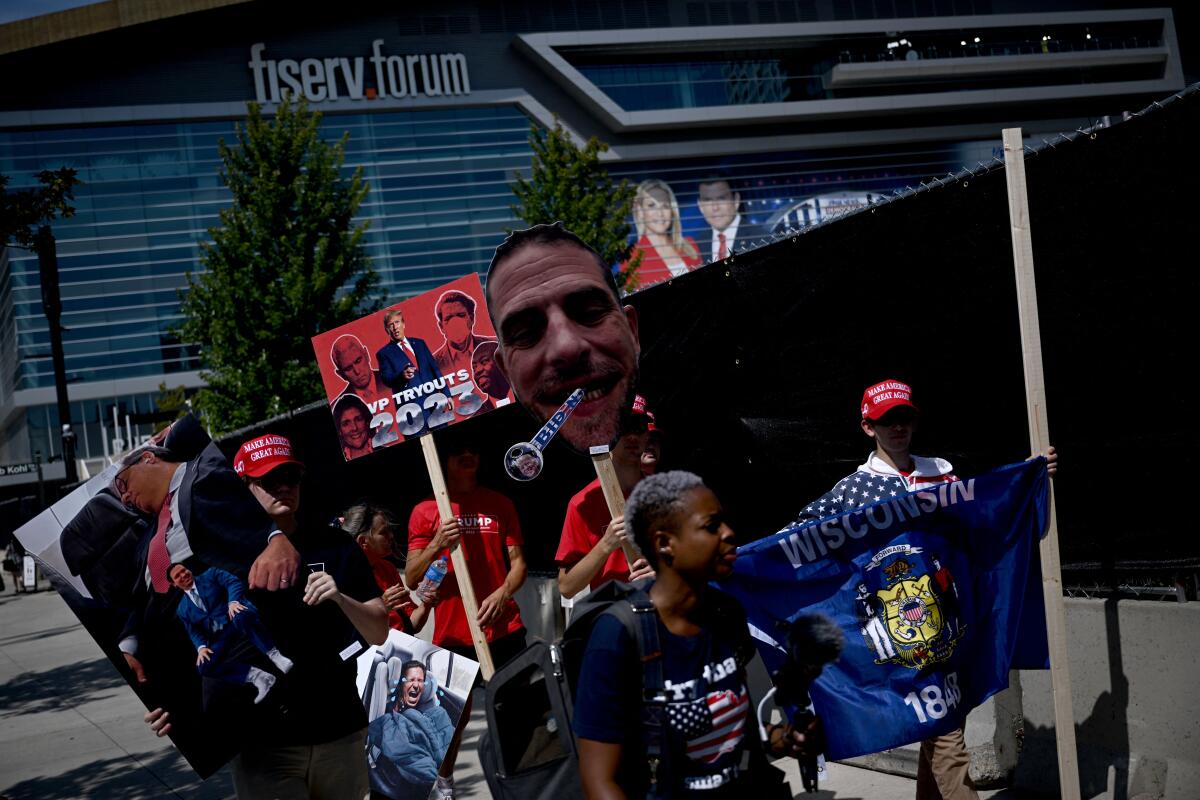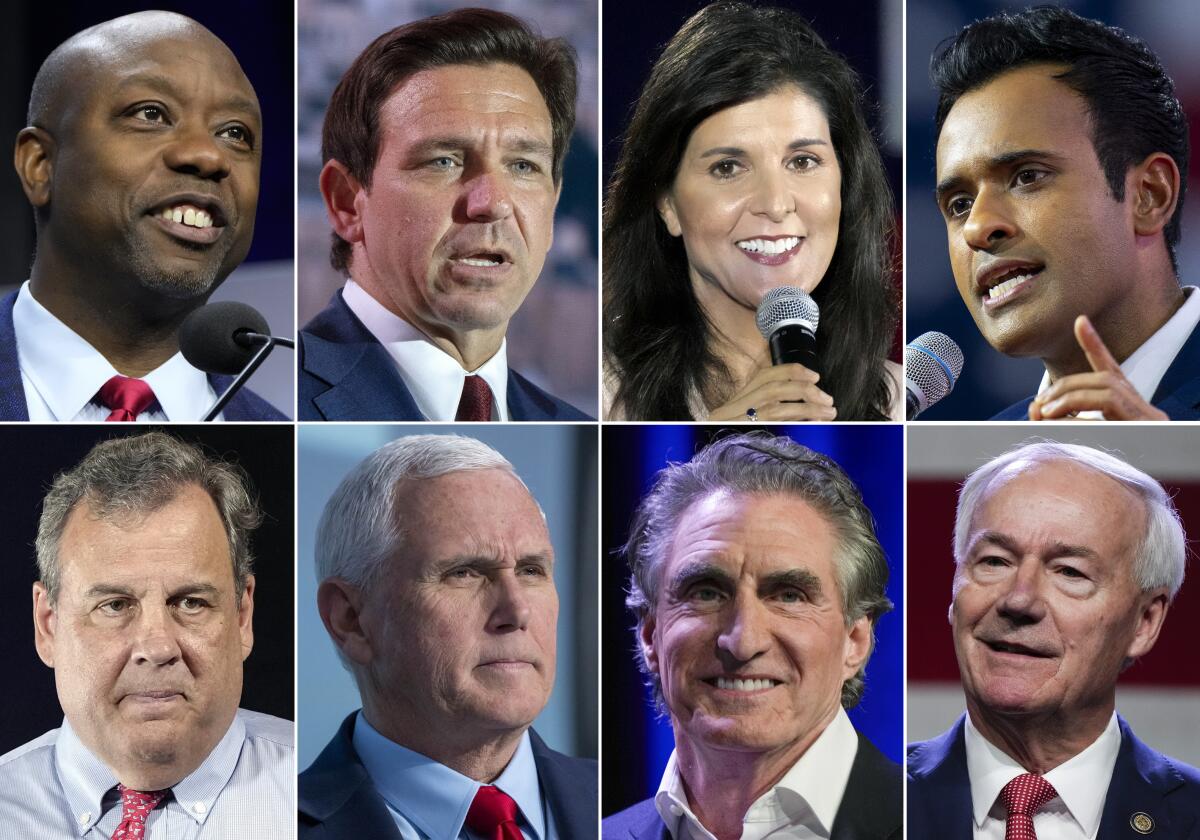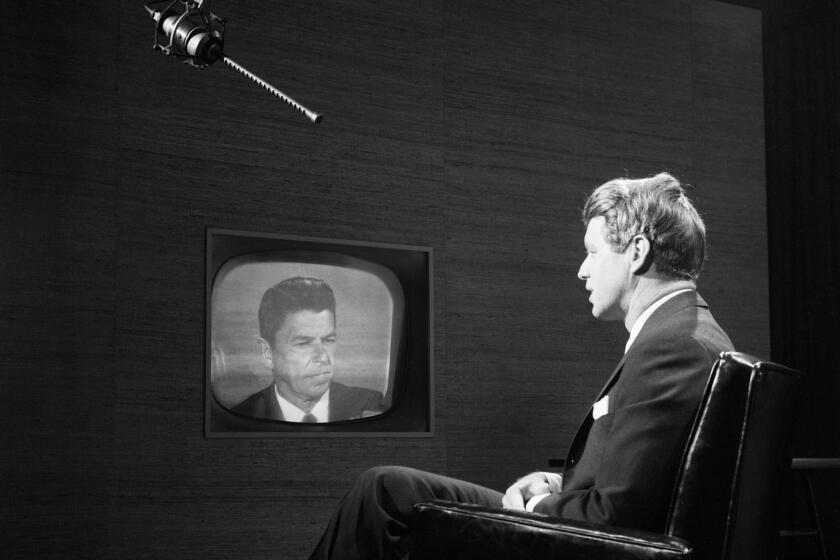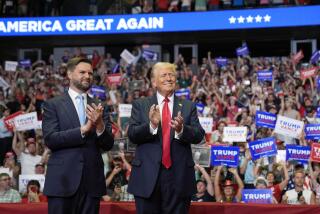News Analysis: Some clear losers in first GOP debate, but the absent Trump emerges largely unscathed

- Share via
MILWAUKEE — Like a chorus line awaiting its leading man, eight Republican presidential hopefuls opened their first debate Wednesday night without the party’s main attraction, hoping to show they can solve a puzzle that has bewildered GOP politicians for eight years: how to get past Donald Trump.
For most of the first hour of the two-hour confrontation, however, the candidates largely tried to ignore Trump’s dominating presence. Instead, it was the campaign’s political newcomer, Vivek Ramaswamy, who quickly became the center of attention, rebutting accusations by former Vice President Mike Pence that he’s unqualified.
“We don’t need to bring in a rookie,” Pence said, the first of several times during the debate’s opening hour in which he focused on the 38-year-old entrepreneur, who has risen in recent polls.
A few minutes later, as Ramaswamy declared himself the “only candidate not bought and paid for,” former New Jersey Gov. Chris Christie fired back.
“I’ve had enough already tonight of a guy who sounds like ChatGPT,” he said.
Pence’s decision to focus so heavily on a largely unknown candidate who is a long shot for the nomination puzzled some Republican strategists, but the attention on Ramaswamy, especially in the debate’s first hour, had a clear impact on a third candidate who had a lot riding on the debate’s outcome, Florida Gov. Ron DeSantis.
DeSantis entered the debate after a prolonged decline in his poll standing and a feeling among many strategists, including those connected to his campaign, that he needed to do something to reestablish the dominant position he held earlier this year as Trump’s chief rival. That didn’t happen.
DeSantis, standing at center stage, reeled off several attacks on President Biden and touted his record in Florida on several occasions, but faded amid the sparring among the candidates on either side of him.
He also notably ducked answering several questions posed by the debate moderators, Fox News anchors Bret Baier and Martha MacCallum, including one about whether he believed that Pence had done the right thing in refusing to go along with Trump’s request to block the count of electoral votes in Congress on Jan. 6, 2021.
After being chided for not answering, he grudgingly said he had “no beef” with Pence.
It was not until nearly an hour into the debate that the focus turned to the man who is currently far ahead of all other candidates as the moderators asked the candidates whether they would support Trump as the nominee even if he were convicted.
“President Trump, I believe, was the best president of the 21st century,” Ramaswamy declared, sticking to his pattern of defending Trump at all times.
Christie drew sustained boos from the debate audience as he denounced Trump.
“Donald Trump said it was OK to suspend the Constitution,” Christie said, referring to a comment Trump made last year. The presidential oath, Christie said, is “to preserve, protect and defend, not suspend.”
Former South Carolina Gov. Nikki Haley also made a plea for the party to move past Trump, although she couched her remarks in less inflammatory rhetoric than Christie.
“It’s time for a new generational conservative leader,” she said. “We have to face the fact that Trump is the most disliked politician in America. We can’t win a general election that way.”
The former president, who skipped the debate, inspires fierce loyalty among about 3 in 10 Republican voters.
But he also causes dread and deep antipathy in other wings of the party and will enter the primaries facing 91 criminal charges in four separate indictments brought by three prosecutors.
His rivals face a singular task: how to capitalize on Trump’s problems without alienating his supporters.

Some analysts see that assignment as hopeless. They point to Trump’s iron grip on his core supporters and the difficulty of uniting the party’s factions behind a single rival.
Others see an opening. They note that a large majority of Republicans say they are at least considering rival candidates.
“I think he’s beatable,” said Republican strategist Alex Conant, whose Washington, D.C.-based firm recently surveyed Republican voters. About a quarter of Republicans will vote for Trump no matter what, another quarter oppose him, and “you’ve got 50% in the middle that like Trump but are open to an alternative,” he said.
A rival would have to “consolidate the quarter that is not going to vote for Trump and chip into his margins among the half who are open to someone else,” he said. For that to happen, one candidate will have to emerge early as the plausible Trump alternative.
The choice facing the rivals boils down to actively trying to beat the 77-year-old Trump or aiming to cultivate his voters in hopes of becoming his stand-in if something, such as his age or the criminal charges, renders him unavailable.
Eight GOP hopefuls — but not Donald Trump — will meet Wednesday night for the first debate of the campaign season. Here’s a look at who’s on stage.
As their debate performances made clear, the challengers, only one of whom has run for president before, offer very different answers to that central strategic question.
DeSantis and Ramaswamy have pitched themselves to the pro-Trump wing of the party as fellow admirers of the former president.
DeSantis has sometimes obliquely criticized Trump and has tried to outflank him to the right on policy, but has largely not responded to Trump’s repeated attacks.
At the other extreme, Christie and Asa Hutchinson, the former Arkansas governor, have chosen to run squarely at Trump. They don’t have much to show for it. Their presence has largely served to demonstrate how much the Republican electorate resists direct criticism of the former president.
The other four candidates have arrayed between those polls, with Pence alternating praise for Trump’s presidency with denunciations of his actions on Jan. 6, 2021, and the two South Carolinians in the race, Haley and Sen. Tim Scott, doing their best to avoid talking about Trump unless forced.
North Dakota Gov. Doug Burgum, almost unknown outside his home state, has mostly focused on introducing himself to voters. The 67-year-old governor participated in the debate while on crutches after tearing his Achilles tendon in a pickup basketball game Tuesday.
When Ronald Reagan and Robert F. Kennedy debated, they set a precedent for Gavin Newsom and Ron DeSantis, who each face impediments to their White House ambitions.
The session also highlighted fissures in the party on issues. That’s true even though televised face-offs aren’t often forums for deep thoughts on governance. Debate coaches urge candidates to aim for viral moments, not policy discussions.
The two most prominent divides involve support for Ukraine and opposition to abortion.
Trump’s friendliness toward Russian President Vladimir Putin has pulled a large share of the party into opposition to Ukraine. DeSantis and Ramaswamy both have expressed skepticism about additional U.S. aid to Kyiv. By contrast, Pence and Christie, who both have traveled to Ukraine in recent months, and Haley, who served as Trump’s U.N. ambassador, have stayed with the party’s pre-Trump hawkish internationalism.
The disagreement on that issue had Pence and Ramaswamy shouting at each other when the debate turned to the Russian invasion of Ukraine.
Ramaswamy called sending more U.S. funds to Ukraine “disastrous.”
As Pence began explaining his view that the United States can solve problems locally and “be the leader of the free world,” Ramaswamy interrupted: “I have a news flash — the U.S.S.R. does not exist anymore. It fell back in 1990,” he said, referring to the 1991 collapse of the Soviet Union.
Their heated exchange prompted the moderators to repeatedly ring the timer bell to try to restore order.
On abortion, the GOP has struggled ever since last year’s Supreme Court ruling that overturned Roe vs. Wade and ended the national guarantee of abortion rights. The decision suddenly transformed Republican opposition to abortion from rhetoric to policy, a shock to many voters, who have responded angrily in a series of state elections, most recently in Ohio, where the antiabortion position lost badly in a referendum this month.
That’s left the party caught between its large and influential bloc of antiabortion voters and its desire to appeal to swing voters. Antiabortion groups have demanded the candidates support a nationwide ban, an idea embraced by Pence and Scott. Other candidates, including Trump, DeSantis and Haley, have tried to avoid being pinned down to a policy, while giving rhetorical support to the antiabortion cause.
The candidates showed their differences on the issue early in the debate as Pence and Scott stressed their support for a nationwide abortion ban.
“A 15-week ban is an idea whose time has come,” Pence said.
Scott echoed that, declaring, “We cannot let states like California, New York and Illinois have abortions on demand.”
“We must fight for life,” he said.
Haley disagreed, calling herself “unapologetically pro-life,” but saying that the antiabortion side is nowhere close to having enough votes in the Senate to pass an abortion ban.
“Don’t make women feel like they have to decide on this issue,” she said, alluding to the political peril that abortion may hold for Republicans. “A Republican president can’t ban abortion.”
Mehta reported from Milwaukee and Lauter from Washington. Times staff writers Faith Pinho in Los Angeles and Noah Bierman in Washington contributed to this report.
More to Read
Get the L.A. Times Politics newsletter
Deeply reported insights into legislation, politics and policy from Sacramento, Washington and beyond. In your inbox twice per week.
You may occasionally receive promotional content from the Los Angeles Times.













